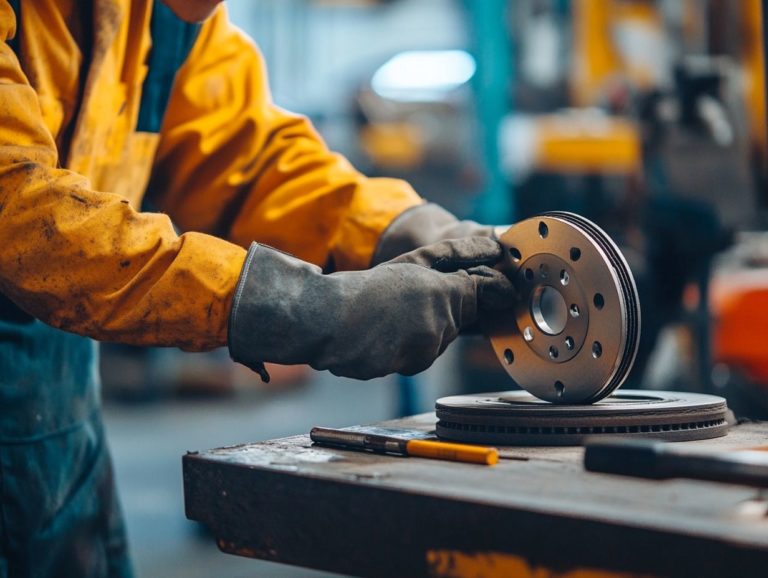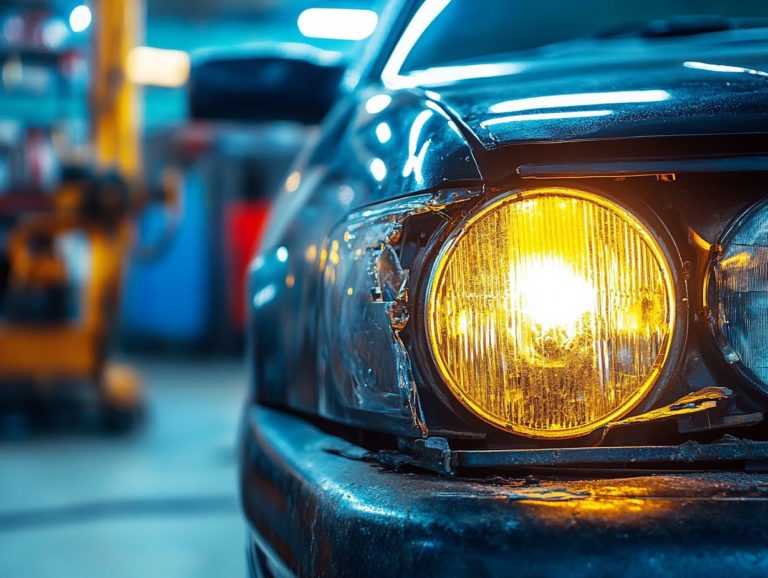5 Common Repairs That Indicate Serious Issues
Homeownership brings a unique blend of joy and responsibility. However, some issues can hint at deeper problems that need attention.
From a leaking roof to electrical issues, certain repairs deserve your utmost focus. Ignoring these critical fixes can lead to expensive consequences that jeopardize both your safety and your home’s value.
Let s explore five critical repairs that demand your attention! We ll explain why they matter and how to spot the signs that require your immediate focus.
Uncover effective solutions and preventative measures to help protect your investment and ensure your home remains the sanctuary you envision.
Contents
- Key Takeaways:
- 1. Leaking Roof
- 2. Cracked Foundation
- 3. Electrical Problems
- 4. Plumbing Issues
- 5. Mold Growth
- Why Should These Repairs Not Be Ignored?
- Frequently Asked Questions
- What are 5 common repairs that could indicate serious issues with my vehicle?
- What should I do if I notice any of these common repairs in my vehicle?
- Are there any warning signs that could indicate a serious issue with my vehicle?
- How can I prevent serious issues with my vehicle?
- What if I can’t afford the cost of repairs for a serious issue?
- Should I still be concerned if my vehicle is running fine despite one of these common repairs?
Key Takeaways:
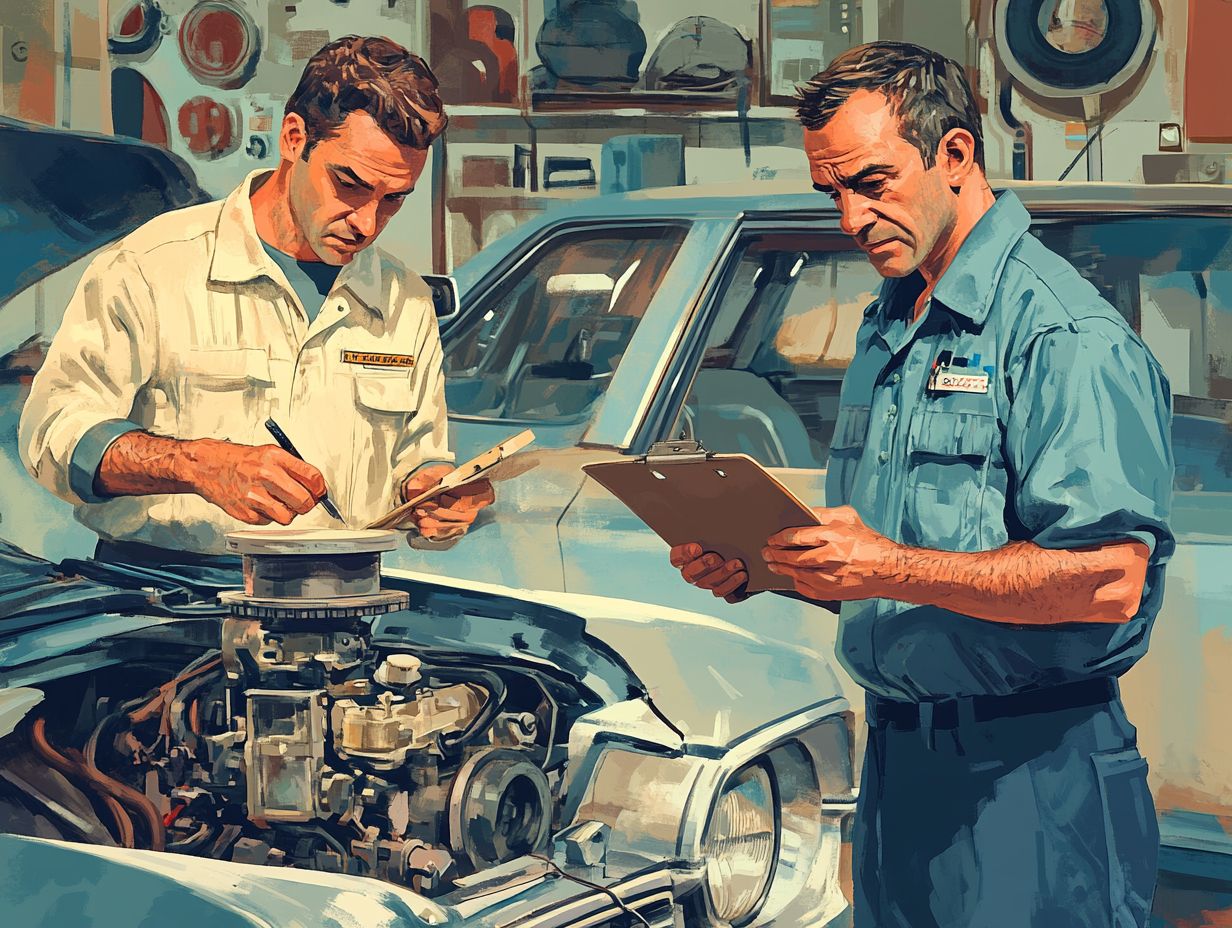
- Ignoring common repairs can lead to serious consequences such as property damage and diminished value.
- Regular maintenance and prompt attention to repairs can prevent more costly issues in the future.
- Look for signs like leaks, cracks, and mold growth. Address these immediately to avoid further damage and expenses.
1. Leaking Roof
A leaking roof isn t just an aesthetic concern; it can lead to significant structural damage over time, putting your entire home at risk. Water seepage can foster rust issues, trigger electrical problems, and ultimately compromise your home s safety and performance.
Several factors contribute to a leaky roof, including wear and tear from age and harsh weather conditions. Neglecting routine maintenance like failing to clear debris from gutters or checking seals around windows only amplifies these problems.
Look for telltale signs such as water stains on the interior ceiling or walls, which may indicate potential leaks. The appearance of mold can signal moisture issues that require immediate attention.
By staying vigilant and tackling these red flags early on, you can significantly reduce the risks associated with leaking roofs and enhance the overall longevity of your home.
2. Cracked Foundation
A cracked foundation can drastically undermine your home’s strength and stability, potentially leading to serious problems, including misalignments and undue stress on various components.
When the foundation is compromised, you could face serious misalignments and additional issues that necessitate further inspections and repairs, which can quickly add up in cost. To mitigate these risks, it s essential to conduct regular checks of your home s foundation.
Prioritizing preventative maintenance is key address any visible cracks promptly and keep your property free from corrosive elements that could worsen foundation damage.
By routinely checking for signs of wear and tear, you not only preserve the foundational support of your home but also extend its overall lifespan, ensuring a safer living environment for you and your family.
3. Electrical Problems
Electrical problems in your home can show up as warning lights flickering on the panel or a stubborn refusal to power on, pointing to issues that might range from a faulty circuit to intricate wiring failures.
Common culprits often include faulty breakers and wiring issues, both of which can significantly affect your home’s performance and safety. When electrical systems fail, you could find yourself without power, stranded and unable to use essential systems.
To catch these issues before they escalate, it’s crucial to engage in regular troubleshooting. Check the electrical system s health, inspect wiring connections, and keep a keen eye on those warning indicators. Adhering to a consistent maintenance schedule not only extends your home’s lifespan but also guarantees safe living conditions and optimal performance.
4. Plumbing Issues
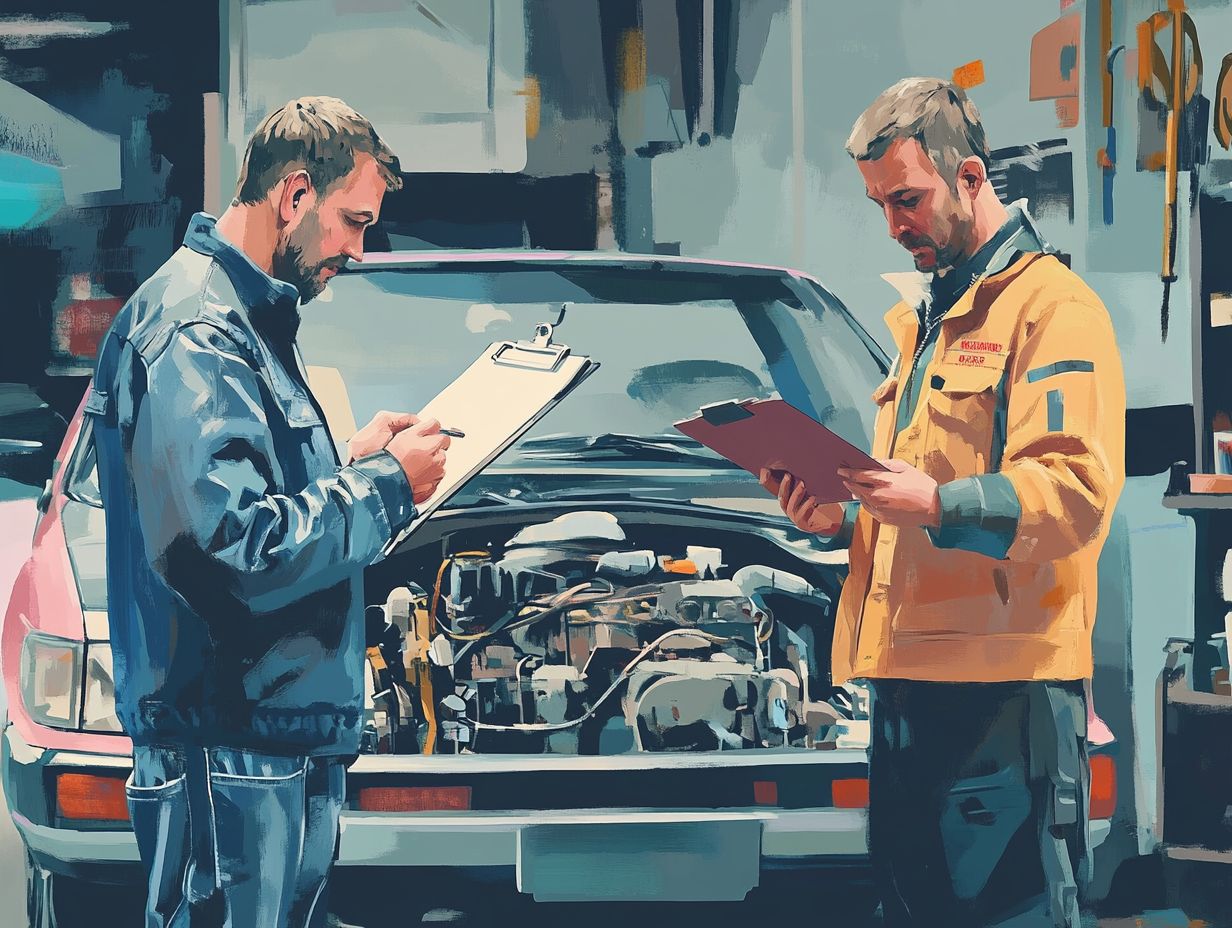
Plumbing issues, especially in the cooling system, can lead to serious problems. Radiator leaks can affect both engine performance and fuel economy.
Watch for signs like overheating. This is indicated by the temperature gauge climbing above normal levels or coolant pooling beneath your vehicle.
Regular fluid checks are vital for keeping your vehicle in top shape. They help catch problems early, preventing expensive repairs later.
These preventive measures ensure your vehicle remains efficient and lasts longer.
5. Mold Growth
Mold growth can be a serious issue, especially in damp conditions. It leads to unpleasant odors and health risks while indicating deeper car problems.
This often comes from water leaks, like damaged seals around windows or sunroofs. Poor ventilation can worsen the situation, trapping humidity inside your vehicle.
The impact of mold on your car’s interior is significant. It affects both aesthetics and health through exposure to allergens and toxins.
To combat this issue, regular cleaning is essential:
- Vacuum your carpets and upholstery.
- Use antimicrobial sprays.
- Dry any spills promptly.
Check for leaks and ensure proper airflow to keep mold away. Taking these steps helps maintain a clean, healthy environment in your vehicle.
Why Should These Repairs Not Be Ignored?
Ignoring repairs like electrical issues, leaks, or structural cracks can lead to serious complications. Familiarizing yourself with the 5 common repairs for family vehicles can help prevent higher repair costs and reduce risks to your vehicle’s safety and performance.
Postponing maintenance jeopardizes not just your comfort but also your wallet. Delayed repairs can escalate minor issues into major failures.
To avoid these outcomes, prioritize timely repairs. This approach enhances your vehicle’s longevity and ensures a safer ride.
Potential Consequences of Ignoring Repairs
Neglecting vehicle repairs can lead to escalating mechanical issues and decreased fuel efficiency. You may end up in hazardous situations that could result in accidents.
For example, ignoring engine sputtering often caused by neglected spark plugs could leave you stranded or facing hefty repair bills. A persistent check engine light can signal serious damage over time, compromising your vehicle’s performance.
Regularly monitor warning lights and follow a maintenance plan to prevent headaches. Staying proactive helps you avoid unexpected breakdowns.
How Can These Repairs Be Prevented?
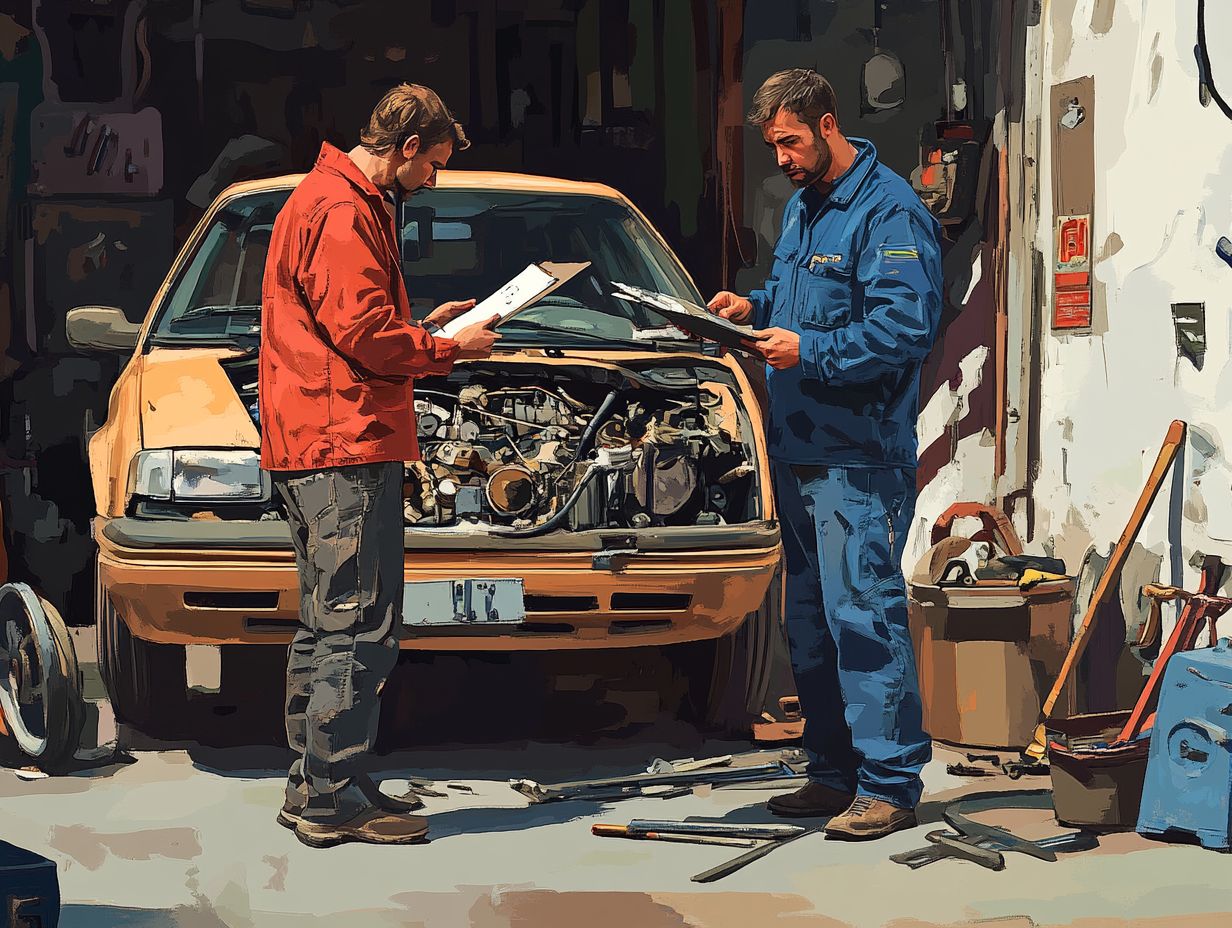
Want to avoid costly repairs? Preventative maintenance is your best friend! By conducting regular vehicle inspections and adhering to timely service intervals, you can identify potential issues before they escalate into serious problems.
Incorporating essential practices such as regular oil changes, brake maintenance, and fluid checks not only enhances your vehicle’s performance but also extends its lifespan. Adopting a structured maintenance schedule allows you to manage your care routine proactively.
For instance, sticking to the manufacturer s recommendations for oil change intervals can significantly improve your engine’s health.
Stay on top of brake maintenance to ensure your safety while driving. Regularly checking fluids like coolant and transmission fluid helps maintain optimal operating conditions. By prioritizing these practices, you promote efficiency and longevity, ultimately leading to a more enjoyable driving experience.
What Are the Signs That Indicate These Repairs Need Immediate Attention?
Certain signs indicate that your vehicle needs immediate attention, such as persistent warning lights, unusual noises, or changes in handling and performance that may require common repairs for hybrid vehicles to address underlying issues.
For instance, if your engine starts to sputter unexpectedly, it could be signaling fuel delivery problems or ignition failures that, if ignored, might lead to more significant damage. Similarly, noticeable vibrations during acceleration may suggest misalignment or tire issues that could jeopardize your safety.
Worn brake pads often produce a squeaking or grinding sound, which is your vehicle’s way of warning you that it s time for a replacement to avoid further complications. Don t wait! Consult a mechanic now to ensure your vehicle’s safety.
How Can These Repairs Impact the Value of a Property?
The condition of your vehicle plays a pivotal role in determining its resale value. Unattended repairs can lead to depreciation and may deter potential buyers, underscoring the necessity of regular car care.
When you prioritize regular inspections and tune-ups, you re not just enhancing your vehicle’s performance; you’re also preserving its visual charm, an essential factor in attracting buyers.
Maintaining detailed service records acts as a clear testament to the vehicle’s upkeep, providing reassurance to potential buyers and facilitating smoother transactions.
On the flip side, neglecting minor repairs can escalate into significant expenses down the road, ultimately compromising both your driving safety and resale prospects. By adopting a proactive approach like timely oil changes and brake checks you can greatly enhance your vehicle’s perceived value, making every investment in maintenance well worth it.
What Are the Possible Solutions for These Repairs?
Possible solutions for common car repairs include seeking professional automotive services, employing DIY methods for minor issues, and investing in high-quality vehicle components to enhance longevity and performance.
When faced with car troubles, quickly decide whether to go professional or tackle it yourself. Professional mechanics come armed with advanced diagnostic tools tools that can quickly identify car problems and expertise, making them the go-to choice for complex issues that demand intricate solutions.
On the other hand, for minor repairs like changing wipers or replacing brake lights, DIY approaches can be both cost-effective and empowering. It’s essential to prioritize the quality of replacement parts; opting for Original Equipment Manufacturer parts when possible can significantly boost your vehicle s durability.
Utilizing online resources, forums, and repair manuals can provide you with valuable insights, guiding you through troubleshooting and ensuring a successful repair experience.
Frequently Asked Questions
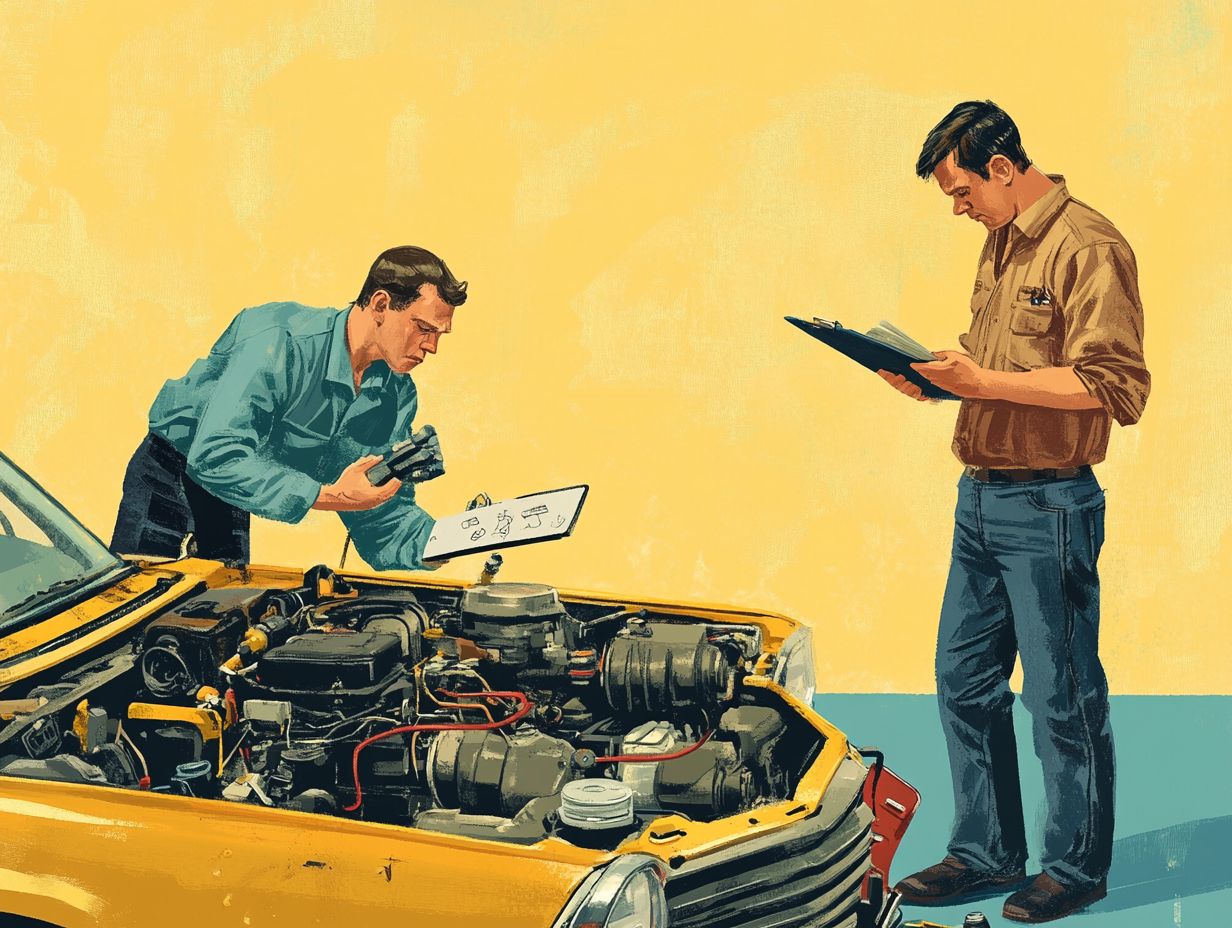
What are 5 common repairs that could indicate serious issues with my vehicle?
1. Engine misfiring: This means your engine may not be running smoothly and could point to a problem with the ignition or fuel system, or even a more serious internal issue.
2. Overheating: If you constantly need to add coolant or if your car overheats, it could signal a big problem with the cooling system or the engine itself.
3. Transmission problems: If your transmission seems to slip, it might be low on fluid or have worn-out internal parts that need attention.
4. Brake issues: If your brakes squeak, grind, or feel spongy, this could mean you need new brake pads, or it might indicate a more serious problem with the braking system.
5. Steering problems: Difficulty turning or a shaking steering wheel may suggest worn-out suspension parts or a more serious issue with the steering system. For solutions, check out these quick fixes for common car issues.
What should I do if I notice any of these common repairs in my vehicle?
If you notice any of these signs, get your vehicle checked today! Ignoring these issues can lead to further damage and could put you and others at risk on the road, especially with common repairs for luxury vehicles that may need attention.
Are there any warning signs that could indicate a serious issue with my vehicle?
Look out for strange noises, unusual vibrations, and a drop in performance or efficiency these are all warning signs that your vehicle may need immediate attention.
How can I prevent serious issues with my vehicle?
The best way to avoid serious problems is to stay on top of regular maintenance. Address any warning signs or common repairs as soon as they pop up. Regular oil changes, tune-ups, and inspections by a qualified mechanic can keep your vehicle running well.
What if I can’t afford the cost of repairs for a serious issue?
If you’re struggling to pay for repairs, look into options like payment plans or loans. Act quickly to prevent more costly repairs down the road!
Should I still be concerned if my vehicle is running fine despite one of these common repairs?
Even if your vehicle seems fine, don’t ignore these 5 warning signs your car needs immediate repair! They could hint at larger and potentially serious issues. Always get your vehicle inspected by a professional to ensure it’s safe and efficient.

